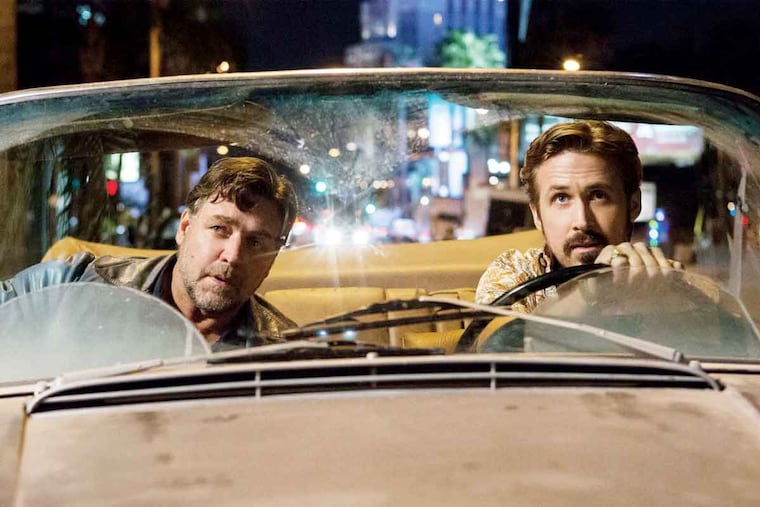Until film tax credits roll in Pa., no lights, no camera, no action
Spotting a Hollywood megastar on set anywhere in Southeastern Pennsylvania this year will take more than a telephoto lens or a lucky break.

Spotting a Hollywood megastar on set anywhere in Southeastern Pennsylvania this year will take more than a telephoto lens or a lucky break.
Because for the first time in a good decade, no major feature films are slotted to be shot in or around the nation's fifth-largest city this year.
The grim milestone has film boosters on edge in a region once adept at luring big-money producers to its cobblestone alleys and tree-lined suburbs. Pennsylvania's film tax credit is no longer working the same big-screen magic here.
Even in Pittsburgh, where the movie business is booming, an exodus of high-profile projects to other states may be on the horizon.
Pennsylvania's $60 million pot of annual film tax credits has proven too small to beat back increasingly attractive incentives offered to filmmakers by other states. Recent muscle-flexing by neighbor Ohio may make things only harder here in the years ahead.
Film-industry officials on both ends of Pennsylvania have asked closed-fisted lawmakers this budget season to expand the tax credit to $100 million. It would help Philadelphia secure projects it is now losing to other cities and states, they say, and help Pittsburgh keep the projects it has and not have to turn away others for lack of available credits.
"If we don't get an increase, there'll be nothing for Philadelphia. We'll be done," said Philadelphia casting director Diane Heery, board chair of the Pennsylvania Film Industry Association.
The trade group has pressed its case in recent visits to the Capitol but has gotten no clear signal that cash-strapped Harrisburg will oblige.
"Cleveland, the last couple of years, they keep getting pieces," said Dawn M. Keezer, director of the Pittsburgh Film Office. "They just did Fast and Furious 8. We had pieces of Unstoppable that went over there."
"It's a significant threat," Keezer said.
Gov. John Kasich doubled Ohio's film tax-credit pot to $40 million with his signature Tuesday, stoking competition with Pennsylvania and the King Kong states of Georgia, where an uncapped pot has created an inrush of productions, and New York, which offers hundreds of millions in credits each year for producers who shoot in the state.
Sharon Pinkenson, whose five-county Greater Philadelphia Film Office is smarting from a recent decampment of local film workers after big movie projects dried up, described the casualties of Pennsylvania's too-small tax-credit pool in basic economics.
"We can't save these [existing] jobs, we can't create new jobs," Pinkenson said Wednesday.
The film tax-credit fund has hovered around $60 million since it became law in 2007 under Gov. Ed Rendell. The money helped Philadelphia and Pittsburgh attract major film projects and, more recently and particularly in Pittsburgh, long-term TV series that return year after year.
A 2015 report by the Milken Institute in Pittsburgh estimated that every dollar that went into such projects produced $1.27 for the overall local economy. The think tank also concluded that every $10 million spent on productions translated into 107 new jobs.
In Philadelphia's case, a succession of big-budget movies by Hollywood powerhouse and Lower Merion native M. Night Shyamalan was the most reliable source of projects for years, while a smattering of local cable TV productions consumed other slices of the pie.
Pittsburgh built a more diversified foundation, attracting big-budget films and TV series, too.
Broadly, Pittsburgh's lower cost of living and union wages has helped it beat Philadelphia as producers increasingly shop for the best location deals. Movies and TV series - more work than local firms can accept - are knocking on Pittsburgh's door.
Money tied up for multiple-year projects in Pittsburgh leaves less each year for filmmakers who want to shoot in and around Philadelphia. Hence, the push to raise the tax-credit pool to $100 million.
"I don't think there are any new projects at all," Pinkenson said. "They're all out of money."
She declined to discuss any aspect of the disparity in labor costs between the two cities.
But even Pittsburgh is feeling heat as other states become more economically attractive as motion-picture locations.
The Nice Guys, a 1970s private-eye caper starring Russell Crowe and Ryan Gosling that opened in May, passed on Pittsburgh - though its director/screenwriter, Pittsburgh native Shane Black, had wanted to film there.
"I think fondly of Pittsburgh and I want to shoot there again, because it's not shot-out," said Black, who also wrote Lethal Weapon 1 and 2. "Vancouver is just so - it's great, but everyone uses it. Pittsburgh is still fresh, pristine, unfamiliar. . . . But the rebate, we need the rebate to make movies now."
In the end, Black said, his team shot for eight weeks in Atlanta and three weeks in super-expensive Los Angeles. After all, the film was set in the City of Angels.
"The three weeks in L.A. cost as much as the eight weeks in Atlanta," Black said. "That's what it's come to. You have to outsource and find the best value. And if Pennsylvania was the best value, if Pittsburgh were the best value, we'd go there."
610-313-8117@Panaritism
Movie critic Steven Rea contributed to this article.